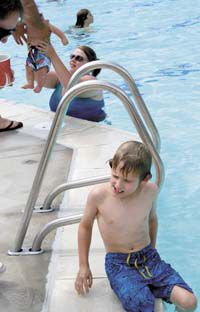| The health department is proposing several changes in public swimming policies after last year’s outbreak. |
The Southeastern Utah District Health Department hopes changes in the state’s swimming pool rule will help prevent a cryptosporidiosis outbreak in 2008.
Proposed changes include:
Instructing people not to swim if they have diarrhea or have had diarrhea in the last two weeks.
Developing methods for pool operators to properly respond to fecal accidents.
Establishing a requirement specifying that children younger than 3 years of age or individuals without bowel control wear a swim diaper as well as a waterproof swim pant.
Public health department director David Cunningham emphasizes the fact that people who use pools have a responsibility to help prevent a crypto outbreak by following several guidelines.
The guidelines include the following
•People who have diarrhea should not be swim..
•People should wait two weeks after diarrhea has stopped before swimming.
•People should take a shower with soap and water before swimming and after using the restroom.
•People should not swallow pool water or get pool water in the mouth.
•People should take regular bathroom breaks while swimming.
Hands should always be washed with soap and water.
•People should change diapers often in the bathroom, not at the pool side.
•Adults should wash a child’s bottom with soap and water after changing a diaper.
People who change diapers should also wash their hands with soap and water.
Last summer and fall, Utah experienced the largest reported recreational water associated outbreak of cryptosporidiosis in the United States.
Most of the victims reported swimming at a recreational water facility prior to getting sick.
Infection with cryptosporidiosis causes watery diarrhea, stomach cramps/pain, nausea, vomiting, fever, and as a result of the diarrhea, dehydration and weight loss.
Symptoms usually last about one to two weeks, and may go in cycles in which a person may feel better for a few days, and then feels worse again.
Cunningham stresses the importance of everyone’s help in this.
“Anyone can get or spread cryptosporidiosis,” he said. “In order for these rules to have an impact it is important for all swimmers to take healthy swimming behavior seriously.”
For more information, residents may contact the SEUDHD office at 637-3671.

